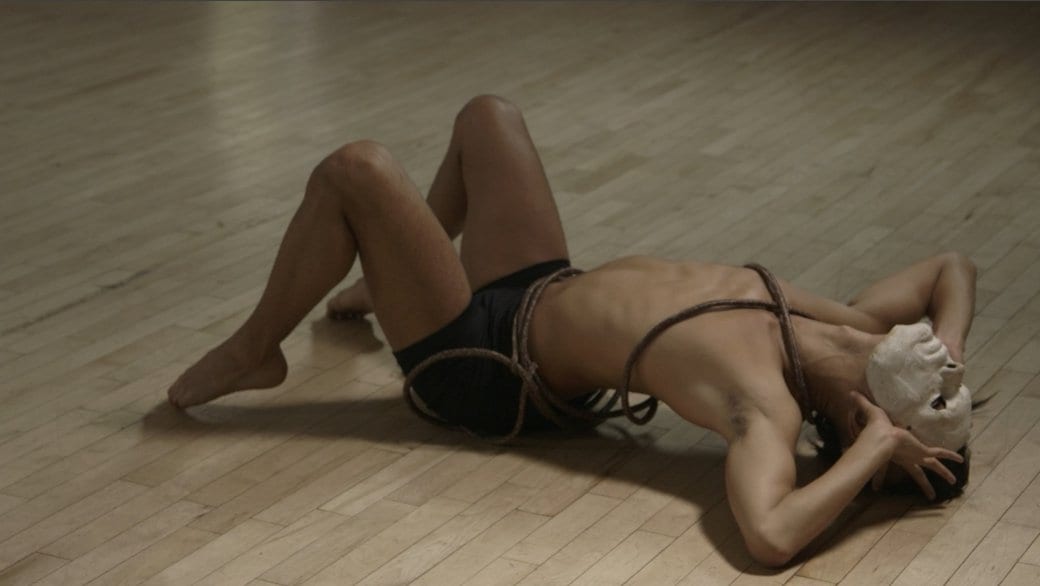A dancer, wrapped in hemp rope, face obscured with a white mask, kneels on the floor.
He beckons, asking us to look at what is about to happen. Then he begins to dance, but his movement quickly becomes a struggle with the rope.
He flings it off, and begins to tear at the mask. Finally, he throws the white plaster to the ground and pounds it with his fists. Standing up, he raises his arms to us, silently asking to be seen.
The dancer is Sze-Yang Ade-Lam, and the dance is a remarkable one.
It belongs to Pei Lim, a talented Asian Canadian dancer, poet, nurse and AIDS activist who died in 1992. Lim left a profound mark on the Canadian gay community, creating the practice of commemorating the names of AIDS victims on bench plaques around Vancouver. If nowhere else, he is recognizable as the dancer in the final credits of Track Two, the groundbreaking 1982 documentary about the Toronto bathhouse raids.
Pei was also roommate and friend to Richard Fung, a young gay artist who was making his first documentary film, Orientations, about the experience of gay and lesbian Asian Canadians in 1984. Fung captured the dance in Orientations, along with the stories of 13 other young gay activists.
More than three decades later, Ade-Lam, another young queer Asian Canadian dancer, is reinterpreting the same dance, for the same director — an echo across a generation.
This is the theme of Fung’s newest film, Re:Orientations. What does Asian Canadian gay and lesbian identity look like 32 years after he first picked up a camera?
Of his 14 participants, three have died, including Lim, and four either refused to participate or are unreachable. Fung interviews the remaining seven, skipping back and forth between 1984 and the present, and between the older generation and a new crop of queer Asian voices.
The most captivating moments of an otherwise visually subdued film are all the same: watching the older generation watch and react to their younger selves on screen. They laugh and shake their heads and wince at their own brashness and naivety, momentarily forgetting the camera in their face here in the present.
“People tend to think Chinese gay men are passive,” says a young Paul Cheung in 1984, leaning casually against a tree. “It’s always white men who are approaching them. So I figure, I’m not interested in men who approach me. . . They assume that I’m passive, which I’m not.”
Present-day Cheung, ruefully chewing on his tongue, rolls his eyes at his younger self. “I don’t know why I said what I said,” he says. “Maybe it’s because I’m self-conscious about my age now, and I take what I can get.”
Fung says he noticed strikingly similar themes in directing the two films. “Something that shocked me is how gay Asian men, of all kinds of Asianness, complain about how they are viewed in a sexual context,” he says. “That took me aback when I was working in the ’80s. And today, with apps, which are uncensored, racist feelings don’t have to be filtered, and many younger people feel that things haven’t changed very much.”
But some things have changed.
Many of Fung’s subjects approach their queerness more cautiously than they did 30 years ago, even though being out is easier.
“I feel I’m much more reluctant today,” Prabha Khosla says, watching her younger self chat with other lesbians of colour on the steps of a collective queer house on Dewson Street in Toronto. “I don’t really want to be in the public eye in the same way.”
Fung’s quest in both Orientations and Re:Orientations is to discover the heart of queer Asian Canadian identity. The results are mixed. The last word in the film goes to Judy Han, a University of Toronto professor of human geography, who is skeptical.
“Today, with so many of us actively involved in a variety of social justice movements, not all under the umbrella of Asian, it seems like we need to imagine a different kind of gathering,” she says. “But I don’t think that kind of identity-based politics is all there is.”
I ask Fung if he thinks there is a future for queer Asian identity. He doesn’t know.
“I want this film to be a question,” he says. “A provocation.”
Re:Orientations
Monday, Aug 15, 2016, 9pm
Vancity Theatre, 1181 Seymour St, Vancouver
queerfilmfestival.ca
Read all our 2016 Vancouver Queer Film Festival coverage:
It Runs in the Family: A Filipino family’s coming out story
Chemsex: sensationalist film or useful warning?
In particular, barbara findlay: Meet Vancouver’s pioneering lesbian lawyer
How a Beyonce concert in Brazil helped build queer community
Why four Latina lesbians were accused of raping children
Aligarh rooted in India’s flip-flop on gay rights
Can a gay man be attracted to a bisexual woman?
What happened to the gay dancers who toured with Madonna?
Troublemakers: When young queers tell their elders’ stories
Two Soft Things, Two Hard Things uncovers LGBT Inuit history
And our paid sponsored content, written by the Vancouver Queer Film Festival:
Top picks for queer flicks at Vancouver Queer Film Festival 2016
The steamiest scenes at the 2016 Vancouver Queer Film Festival


 Why you can trust Xtra
Why you can trust Xtra


